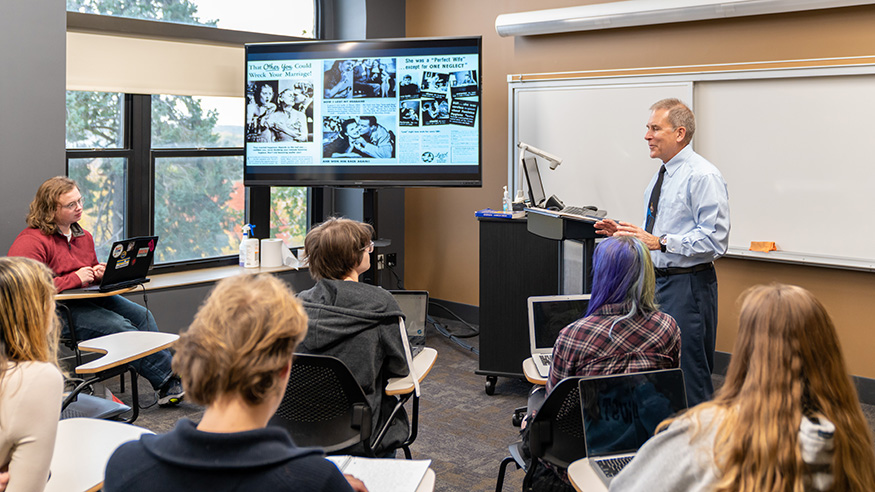Free expression on campus
Augustana College embraces freedom of expression, and recognizes the privilege and responsibilities it carries. The opportunity to express, research, study, and discuss opinions and views is the foundation of intellectual growth. Freedom of expression also raises questions, and this webpage links to resources that will help clarify what supporting expressive freedom means, while also upholding our community values and principles.
A message from President Talentino:
Resources

All-campus resources
- Statement on freedom of expression
- Our community principles
- Mission, purpose and goals
- Public statements and actions
- Bias reporting
- PEN America Campus Free Speech Guide
Previous college statements related to freedom of expression:

Student resources
Ways to learn more
|
Frequently asked questions
Does the First Amendment apply to the College?
Augustana College is a private educational institution, and is not subject to the First Amendment. The First Amendment prohibits only governmental entities from enacting laws, rules, regulations that abridge freedom of speech. Even in this context, however, free speech is not without limits. A classic example that is often quoted is that free speech does not allow an individual to scream “FIRE!!” in a crowded movie theater without consequences.
While Augustana, as a private institution, is not bound by the First Amendment, expressive freedom is a critical aspect of maintaining and sustaining a learning environment that benefits from sharing, discussing, and understanding views that differ from our own.
Is President Talentino's Statement on Freedom of Expression a policy?
No, the Statement on Freedom of Expression is just that: a statement issued by President Talentino and endorsed by the Board of Trustees. The purpose of this statement is to help our community understand the value the College President and the Board of Trustees places on free speech and its role in fulfilling our mission, while also noting that there are boundaries. Some of these boundaries result in disciplinary action when crossed; other boundaries may not result in disciplinary action, but they also do not represent our community values. The statement provides context within which existing policies will be reviewed, upheld and enforced on campus.
What is the "prohibited harassment" that is not protected speech under this statement?
The College's Policy Against Discrimination and Harassment provides more information on the kinds of behaviors that may constitute prohibited harassment. The behaviors, which can include speech, must be based on a protected class to be prohibited by the Policy Against Discrimination.
In order to create a hostile environment, the conduct must be subjectively and objectively severe or pervasive so as to prevent or limit a person’s ability to participate in the College’s education program and activities.
What about speech that causes harm? Is that protected?
Speech that causes harm to another individual may or may not be prohibited by the College.
The College's Policy Against Discrimination and Harassment prohibits speech that creates a hostile environment when the speech is based on the classes of prohibited discrimination. For example, speech based on a person’s ethnicity, race, gender or disability could create a hostile environment that violates College policy. Speech in the form of threats, physical intimidation, or “bullying” may also violate the College’s policies.
Speech that challenges a deeply held belief that is not based on any of the protected classes is not prohibited, even though it may be perceived by an individual to be psychologically harmful.
An individual who feels harmed, threatened or otherwise negatively impacted by the words and/or conduct of another individual should report their concerns. Even when the speech is not prohibited by the College, other remedial measures may be available to help individuals in dealing with or avoiding the negative effects of speech that is found to be deeply offensive or even harmful.
What should I do if I believe I am the victim of harmful speech?
Individuals who feel they are being subjected to speech or other conduct that is harmful are encouraged to report the behavior. As noted above, speech that one deems offensive or harmful may not violate College policies. Even if there are no disciplinary consequences, however, there are often options available to minimize the impact.
Other reporting options include:
- Behavior that involves sex discrimination, the matter may be reported to the College's Title IX Coordinator. See information on the College's Title IX reporting process.
- Behavior that may constitute other forms of prohibited harassment or discrimination. See reporting options.
- Bias incident reporting.
The College also offers a Campus Conduct Hotline service available 24/7 to employees and students to report complaints and concerns. Complaints may be made by calling 1-866-943-5787.
Why doesn't the College issue its own statement condemning certain actions or events?
Augustana College statements will generally be limited to those matters that directly impact our community and/or our mission. The College’s Public Statements & Actions Policy provides more information on when the College will issue a statement or otherwise use its institutional voice.
Can I engage in a protest on campus?
Students may engage in peaceful protests, provided they have complied with the College’s requirements outlined in the Policy on Protests & Demonstrations. Protests and demonstrations organized by students are open only to the Augustana community, and may not be attended by individuals from outside the community.
What is academic freedom?
Academic freedom ensures and protects the freedom of faculty to research, publish, and present in the classroom information relative to the subject matter they are teaching. Augustana College has endorsed the American Association of University Professor’s 1940 Statement of Principles on Academic Freedom and Tenure, which provides, in part, that:
- Teachers are entitled to full freedom in research and in publication of their results, and
- Teachers are entitled to freedom in the classroom in discussing their subject.
The Statement also clarifies that with this freedom comes the responsibility to be accurate, exercise appropriate restraint, show respect for the opinions of others, and indicate that they do not speak for the institution.

